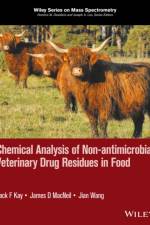av JF Kay
2 409
Provides a single-source reference for readers interested in the development of analytical methods for analyzing non-antimicrobial veterinary drug residues in food Antibiotics are used in a variety of production industries around the world. Some of the industries include dairy, livestock, poultry, and honey production. They are used in animals to promote growth and prevent disease. However the frequent use of antibiotics can cause residues to be found in products of animal origin, such as meat and milk. The presence of excess residues above the allowable maximums is illegal and can cause health problems including allergic reactions and carcinogenicity. Chemical Analysis of Non-antimicrobial Veterinary Drug Residues in Food provides a single-source reference for readers interested in developing analytical methods for analyzing non-antimicrobial veterinary drug residues in food. To ensure the safety of the food supply and to facilitate international trade, government agencies and international bodies establish standards, guidelines, and regulations that food producers and trade partners need to meet, respect, and follow. A primary goal of national and international regulatory frameworks for the use of veterinary drugs is to ensure that authorized products are used in a manner that will not lead to non-compliance residues. However, analytical methods are required to rapidly and accurately detect, quantify, and confirm antibiotic residues in food to verify that regulatory standards have been met and to remove foods that do not comply with these standards from the marketplace. This book covers key aspects of the analysis for these residues combining disciplines including sample preparation, the application of high resolution mass spectrometry in the development of multi-residue, multi-class analytical methods, regulatory standards setting, method validation, and quality assurance and control issues specifically related to multi-residue methods (MRMs). Chemical Analysis of Non-antimicrobial Veterinary Drug Residues in Food features: A comprehensive set of information in the area of consumer food safety and international trade General issues related to measurement uncertainty, screening, and confirmatory methods Techniques ranging from nanotechnology and aptamer based assays covering current and potential applications for non-antimicrobial veterinary drugs Guidance for analysis of banned drugs including natural and synthetic steroids, Resorcylic acid lactones, and Beta-agonists This book can be used by analysts, scientists, managers and/or laboratories that conduct chemical analysis of antibiotic residues in food, drinking water, or even biological and environmental samples. It can also serve as a reference book for students, at universities and colleges, who take subjects related to chemical residue analysis. Jack F. Kay works in the UK Department for Environment, Food and Rural Affairs. He has actively participated in the Codex Committee on Residues of Veterinary Drugs in Food for more than ten years. James D. MacNeil retired as head of the Centre for Veterinary Drug Residues of the Canadian Food Inspection Agency in 2007. He is the former scientific editor for "Drugs, Cosmetics, and Forensics" of the Journal of AOAC International. Jian Wang is currently a research scientist leading a research and development unit for the Canadian Food Inspection Agency in Calgary, Alberta. He has written over thirty publications for various journals and books.

